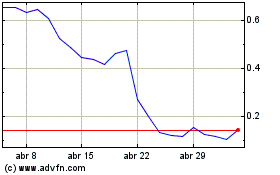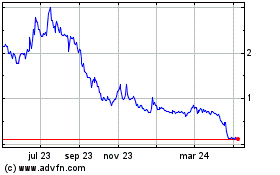Vaxxinity, Inc. (OTC: VAXX), a U.S. company pioneering the
development of a new class of medicines known as AIMs (active
immunotherapy medicines), announced today that Nature Medicine has
published groundbreaking exploratory data from the Company’s Phase
1 clinical trial of UB-312 in patients with Parkinson's disease
(PD). The successful trial included measures of clinical efficacy,
as well as exploratory research funded by The Michael J. Fox
Foundation (MJFF) assessing target engagement in collaboration with
the Mayo Clinic and UTHealth Houston.
UB-312-induced antibodies significantly decreased levels of
aggregated α-synuclein (αSyn), a key pathology in PD and other
synucleinopathies, as measured by a semi-quantitative seed
amplification assay (SAA). This suggests that UB-312 can help to
eliminate the buildup of harmful, toxic forms of the protein αSyn
in the brain. Patients with detectable UB-312-induced antibodies in
cerebrospinal fluid (CSF) exhibited significant improvement in
motor experiences of daily living as measured by the MDS-UPDRS Part
II, a commonly accepted clinical scale. This marks a potentially
significant milestone in the pursuit of innovative PD care. The
Phase 1 successfully met its primary outcome measures,
demonstrating UB-312 was generally well-tolerated and induced
anti-αSyn antibody responses in healthy volunteers and PD patients.
12 out of 13 PD patients who completed dosing developed anti-αSyn
antibodies.
“The publication of this data in Nature Medicine immortalizes
the profound impact of UB-312, leading the charge against the very
core of Parkinson’s,” added Lou Reese, Co-Founder and Executive
Chairman of Vaxxinity. “It sparks a beacon of hope and anticipation
for a future where Parkinson's no longer determines the trajectory
of lives. This is more than just a scientific breakthrough; it's a
battle cry for change, declaring that the status quo in Parkinson's
care is no longer acceptable."
Parkinson’s disease, a progressive neurodegenerative condition,
currently lacks an approved disease-modifying treatment.
Alpha-synuclein, a key protein in PD pathology, forms aggregates
known as Lewy bodies that contribute to neuronal degeneration.
UB-312 is designed to stimulate a targeted immune response against
pathological forms of αSyn.
Notable highlights from the exploratory Phase 1 data published
in Nature Medicine include:
- Two exploratory CSF biomarkers show promise as measures of
target engagement.
- aggregated αSyn, as measured by an SAA
- phosphorylated αSyn (pS129-αSyn)
- PD patients with UB-312-induced antibodies in CSF had
significantly less αSyn aggregation (p <0.01) and pS129-αSyn (p
<0.05) compared to patients without detectable CSF antibody
titers.
- PD patients with UB-312-induced antibodies in CSF showed
significant improvement in the MDS-UPDRS Part II motor experiences
of daily living compared to patients without detectable CSF
antibody titers (p<0.05).
- In vitro, UB-312-induced antibodies preferentially bind to
aggregated forms of αSyn as measured by dot blot, and slow the
aggregation of αSyn as measured by seed amplification.
”UB-312 has the potential to become an important and potent
disease-modifying therapy for Parkinson’s disease. It would be
truly amazing if we could vaccinate people against Parkinson’s
disease in the future!” says Professor Geert Jan Groeneveld,
neurologist and principal investigator of the Phase 1 clinical
trial performed at the Centre for Human Drug Research in Leiden,
the Netherlands.
The publication in Nature Medicine follows the completion of
Part B of the Phase 1 clinical trial, which involved 20 patients
with early PD (Hoehn & Yahr stage ≤ III) dosed with one of two
priming regimens of UB-312 or placebo, and followed for 24 weeks of
observation. Vaxxinity plans to continue its research and
development efforts to advance UB-312 as candidate for PD. Results
from Part A of the trial in 50 healthy volunteers, aged 40 to 85
years, were published in Movement Disorders in 2022 (Yu et al.).
The exploratory biomarker and target engagement research portion of
the trial was funded by The Michael J. Fox Foundation (MJFF), and
marked a two-year collaborative project between Vaxxinity, the Mayo
Clinic, and UTHealth Houston to analyze CSF collected from
patients.
About UB-312UB-312 is an AIM designed to slow
or stop Parkinson's progression by addressing the root cause of the
disease. In the first patient trial, it safely induced antibodies
against toxic alpha-synuclein (αSyn) aggregates, representing a
potential disease-modifying therapy. It is the first active
immunotherapy to demonstrate target engagement in patient CSF using
the αSyn seed amplification assay.
About VaxxinityVaxxinity, Inc. is a
purpose-driven biotechnology company committed to democratizing
healthcare across the globe. The company is pioneering a new class
of medicines known as AIMs (active immunotherapy medicines) with
the goal of disrupting the existing treatment paradigm for chronic
disease, increasingly dominated by monoclonal antibodies, which
suffer from prohibitive costs and cumbersome administration. The
company’s proprietary AIM technology platform has enabled the
innovation of novel synthetic peptide immunotherapy candidates
designed to bring the efficiency of active immunotherapies to the
treatment of chronic diseases, including Alzheimer’s disease,
Parkinson’s disease, migraine, and hypercholesterolemia. The
technology is also implemented as part of a COVID-19 vaccine
program. Vaxxinity has optimized its pipeline to achieve a
potentially historic, global impact on human health.
For more information about Vaxxinity, Inc., visit
http://www.vaxxinity.com and follow us on social media
@vaxxinity.
About the Centre for Human Drug ResearchThe
Centre for Human Drug Research (CHDR) is an independent institute
that specializes in cutting-edge, early-phase clinical drug
research. CHDR develops and uses state-of-the-art methods and
research tools to collect as much information as possible about
candidate drugs in the early phases of clinical development,
helping sponsors make informed decisions regarding the further
development of their product. For more information about CHDR,
visit: www.chdr.nl.
Forward-looking StatementsThis press release
includes forward-looking statements within the meaning of the
Private Securities Litigation Reform Act of 1995. The use of
certain words, including "believe," "may," "continue," "advancing,"
"will" and similar expressions, are intended to identify
forward-looking statements. Forward-looking statements include
statements, other than statements of historical fact, regarding,
among other things: the plans for, or progress, scope, initiation,
duration, enrollment, results or timing for availability of results
of, development of any of Vaxxinity’s product candidates or
programs; the target indication(s) for development or approval, the
size, design, population, location, conduct, cost, objective,
enrollment, duration or endpoints of any clinical trial, or the
timing for initiation or completion of or availability or reporting
of results from any clinical trial; the potential future regulatory
authorization or approval and commercialization of Vaxxinity’s
product candidates; the potential benefits or competitive position
of any Vaxxinity product candidate or program or the commercial
opportunity in any target indication; and Vaxxinity’s plans,
expectations or future operations, financial position, revenues,
costs or expenses. These forward-looking statements involve
substantial risks and uncertainties, including statements that are
based on the current expectations and assumptions of Vaxxinity’s
management about the development of a new class of
immunotherapeutic vaccines and the innovation and efficacy of
Vaxxinity’s product candidates. Various important factors could
cause actual results or events to differ materially from those that
may be expressed or implied by our forward-looking statements,
including, but not limited to: whether UB-311, UB-312, UB-313,
VXX-401, UB-612 or any other current or future product candidate of
Vaxxinity will be approved or authorized by any regulatory agency
for the indications that Vaxxinity targets; any potential negative
impacts of the COVID-19 pandemic, including on manufacturing,
supply, conduct or initiation of clinical trials, or other aspects
of Vaxxinity’s business; Vaxxinity’s product candidates may not be
successful or clinical development may take longer and be more
costly than anticipated; product candidates that appeared promising
in earlier research and clinical trials may not demonstrate safety
or efficacy in larger-scale or later clinical trials or in clinical
trials for other indications; the timing for initiation or
completion of, or for availability of data from, clinical trials
for UB-311, UB-312, UB-313, VXX-401 or UB-612, and the outcomes of
such trials; Vaxxinity’s reliance on collaborative partners and
other third parties for development of its product candidates;
Vaxxinity’s ability to obtain coverage, pricing or reimbursement
for any approved products and acceptance from patients and
physicians for any approved indications; delays or other challenges
in the recruitment of patients for, or the conduct of, Vaxxinity’s
clinical trials; challenges associated with supply and
manufacturing activities; and Vaxxinity’s accounting policies.
These and other important factors to be considered in connection
with forward-looking statements are described in the "Risk Factors"
section of Vaxxinity’s Annual Report on Form 10-K filed with the
U.S. Securities and Exchange Commission on March 27, 2024. The
forward-looking statements are made as of this date and Vaxxinity
does not undertake any obligation to update any forward-looking
statements, whether as a result of new information, future events
or otherwise, except as required by law.
Investor ContactMark
Joinnidesir@vaxxinity.com
Press ContactMcKenna
Millervaxxinity@kcsa.com
Vaxxinity (NASDAQ:VAXX)
Gráfica de Acción Histórica
De Nov 2024 a Dic 2024

Vaxxinity (NASDAQ:VAXX)
Gráfica de Acción Histórica
De Dic 2023 a Dic 2024
